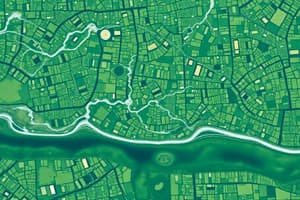Podcast
Questions and Answers
What percentage of Earth's total water is classified as freshwater available for human use?
What percentage of Earth's total water is classified as freshwater available for human use?
- 0.4% (correct)
- 2.5%
- 1.5%
- 3.0%
Which type of water footprint refers to water sourced from precipitation stored in the soil's root zone?
Which type of water footprint refers to water sourced from precipitation stored in the soil's root zone?
- Blue water footprint
- Green water footprint (correct)
- Surface water footprint
- Grey water footprint
What percentage of Earth's freshwater is found in surface water bodies such as lakes and rivers?
What percentage of Earth's freshwater is found in surface water bodies such as lakes and rivers?
- 5.0%
- 2.5%
- 0.3% (correct)
- 0.1%
What is the primary characteristic of blue water footprint?
What is the primary characteristic of blue water footprint?
What holds the largest volume of fresh surface water on Earth?
What holds the largest volume of fresh surface water on Earth?
What is the function of grey water footprint?
What is the function of grey water footprint?
Which of the following describes the majority of Earth's water?
Which of the following describes the majority of Earth's water?
In the hydrologic cycle, where does water exist apart from surface and underground?
In the hydrologic cycle, where does water exist apart from surface and underground?
What percentage of the world's land surface do wetlands cover?
What percentage of the world's land surface do wetlands cover?
What is the primary use of groundwater extracted in arid and semi-arid climates?
What is the primary use of groundwater extracted in arid and semi-arid climates?
What is one intended purpose of constructing a dam?
What is one intended purpose of constructing a dam?
Which type of hydropower plant involves the storage and regulated release of water?
Which type of hydropower plant involves the storage and regulated release of water?
What is the efficiency rate of energy conversion in hydropower plants?
What is the efficiency rate of energy conversion in hydropower plants?
What percentage of the world’s drinking water comes from underground sources?
What percentage of the world’s drinking water comes from underground sources?
Which of the following is NOT an advantage of hydropower plants?
Which of the following is NOT an advantage of hydropower plants?
How much of the liquid fresh water on Earth is found underground?
How much of the liquid fresh water on Earth is found underground?
Flashcards are hidden until you start studying
Study Notes
Distribution of Water Resources
- Earth's water distribution: 97.5% in oceans, 2.5% as freshwater.
- Freshwater availability: 0.4% of total water is easily usable by humans.
- Most freshwater is stored as ice.
Hydrologic Cycle
- Water exists in various forms: atmospheric, surface, underground, and oceanic.
Availability of Water Resources
Water Footprints
- Green water footprint: precipitation stored in soil root zones, used by plants.
- Blue water footprint: sourced from surface or groundwater, includes evaporation and product incorporation.
- Grey water footprint: freshwater needed to assimilate pollutants for water quality standards.
Surface and Groundwater Resources
- Surface freshwater constitutes 0.3% of Earth's total water, including lakes, rivers, and wetlands.
- Lakes contain the majority of fresh surface water.
- Wetlands cover 6% of land and are vital for water conservation.
- Groundwater comprises 96% of liquid freshwater, supporting ecosystems and human activities.
- Approximately 60% of groundwater is used for agriculture in arid regions, with 25-40% providing drinking water.
Dams and Hydropower Plants
Dams as Water Supply Storage
- Dams serve multiple purposes: create reservoirs, regulate stream flow, and manage flooding.
- They often function alongside hydropower plants to generate electricity.
Types of Hydropower Plants
- Three types of hydropower plants:
- Impoundment
- Diversion
- Pumped Storage
Advantages of Hydropower Plants
- Renewable energy source with quick resource recovery.
- High efficiency: 90% of mechanical energy converted to electricity.
- Low maintenance costs make it an attractive energy solution.
Inspirational Quote
- "Thousands have lived without love, but one without water..." - W.H. Auden.
Studying That Suits You
Use AI to generate personalized quizzes and flashcards to suit your learning preferences.




